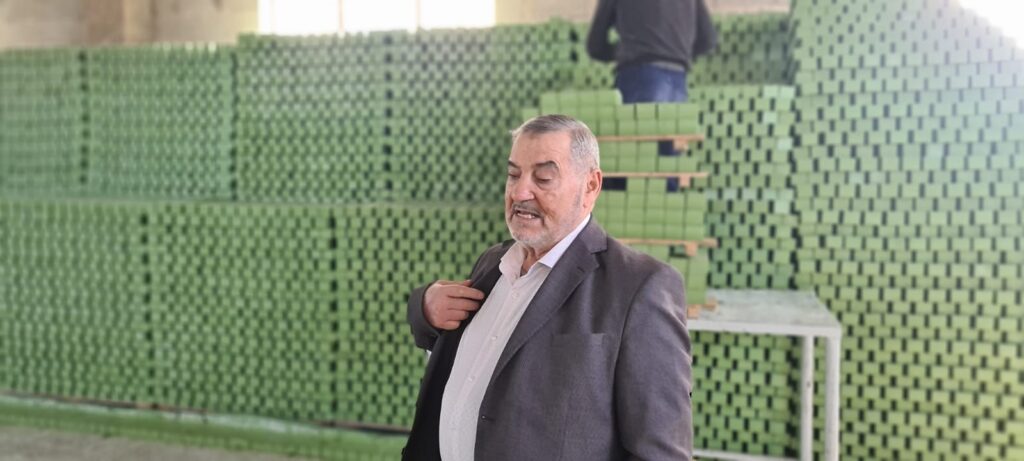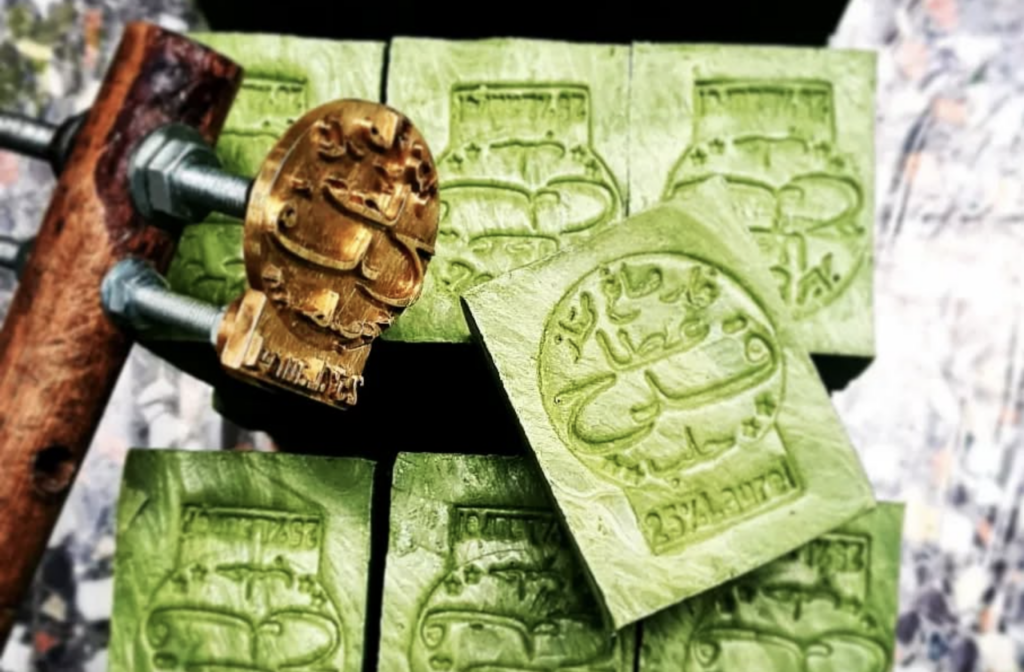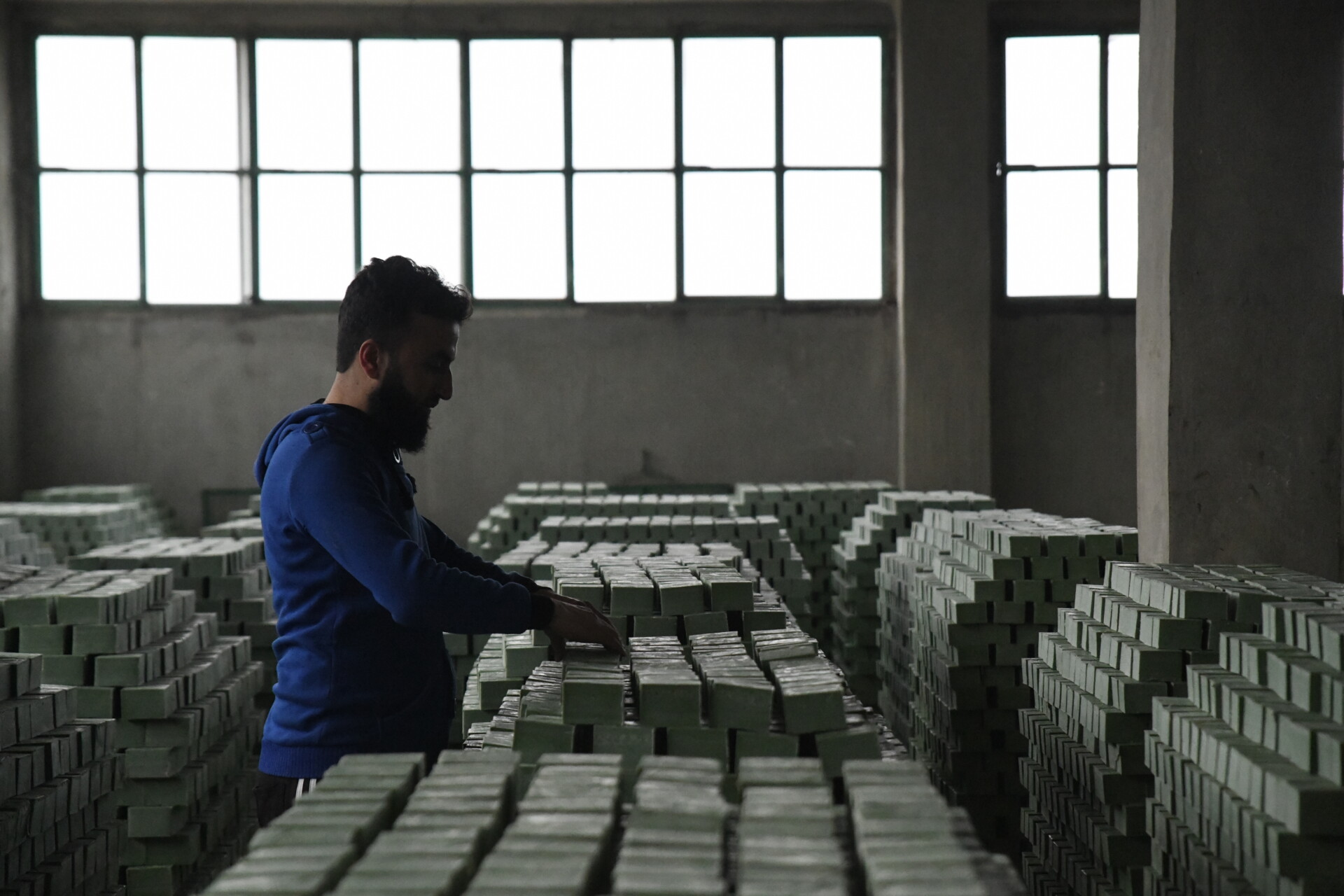For many centuries, the making of Aleppo soap has followed an unchanged process that takes place between the months of November and March.
It begins by mixing hot water and sodium hydroxide in a large cauldron for 12 hours, then gently adding olive oil and, a day later, filtered laurel oil. The resulting green paste is then rinsed a few times with salted water and eventually spread out in a basin and smoothed at the surface. Once solidified, it is hand-cut into blocks, each one stamped with Arabic inscriptions — the factory’s seal, usually bearing the name of the family who proudly produced it.
From his hardly illuminated warehouse, its walls full of cracks, 78-year-old Ata Kadah, owner of Kadah Aleppo Soap and a master of Aleppo soap-making, swears that his old, crinkled hands know the whole process by muscle memory. “The only thing that’s changed over the years is the location,” he says with a tired and teary smile. “This craft is more than just a business to me. It is a link to my roots and identity, and an expression of family legacy.”
Aleppo, hometown of the Kadah family and the birthplace of the soap, known in Arabic as “sabun ghar,” has suffered tremendous losses since the Syrian conflict began in 2011. War and displacement threatened the city’s residents and historic sites, including the locations of its local traditions, and many Syrian soap-makers like Ata had no other choice than to cross the border into Turkey to try to save themselves and their craft.
Despite the fall of the regime of Bashar al-Assad this past December, and Turkey’s growing political pressure on Syrian refugees to leave the country, many artisans are still cautiously pondering their definitive return, even after years of suffering in exile.

In February, the United Nations revealed that more than 250,000 Syrian refugees have returned home from abroad. Although Turkish authorities at the Oncupinar border gate in southeastern Turkey claim that an average of 700 refugees are crossing daily into Syria, the majority remain in Turkey for now — mainly because of slow reconstruction efforts and the still unstable living conditions in Syria.
At the Kadah factory in Nizip, a small town in the Gaziantep province of southeastern Anatolia where Ata has set up production, Syria seems close, yet so far away. The smell of laurel and olive oil pervades the air while the owner inspects with attention the few laborers stomping on the green paste of soap with rackets on their feet to smooth it.
It’s mid-February, and production is in full force. As he picks up a dried soap bar from last year’s batch, Ata travels back in time.
Ata comes from a well-established family of soap-makers in Aleppo who’ve been in this profession for more than 100 years. He was only a teenager when he began to learn the ropes of soap-making after his grandfather shared with him a closely guarded recipe that hadn’t changed for generations. The making of the soap is a family affair that everyone has a small role in, and he still fondly remembers the plentiful olive groves of the Aleppo countryside where he would spend the last two months of every year with the women of the family to collect olives from local trees.
It didn’t take him long before he ran the family’s factory on the outskirts of the city, and when he formed a family of his own, he passed the knowledge on to his son, Mohamed, now 37, who helped him grow it into a business worth millions, exporting to the West and parts of Asia.
The origins of Syrian soap-making date back millennia. Some historical accounts claim that Queen Cleopatra in Egypt and Queen Zenobia in Syria used it to care for their skin and hygiene. When the Crusaders returned to Europe loaded with treasures from the East, Aleppo soap-making won the hearts of European consumers, and thanks to its strategic position along the Silk Road its trade became global.

The success of the soap is not only due to the availability of high-quality raw materials and inherited expertise but also because Aleppo is famous for its historical bathhouses, making soap production an integral part of the area’s cultural heritage, competing with Tripoli in Lebanon and Nablus in Palestine. “All this history made me perceive the gravity of our family’s mission,” explains Mohamed, Ata’s eldest son. “That’s why I thought it was important to carry on this tradition, it’s our cultural pride. As a Syrian, it made me feel important.”
For this reason, Ata was worried not only for himself and his family but also for the future of his craft when the war broke out — threatening not only human lives, but centuries-old traditions. In 2013, Assad’s siege of Aleppo had already made it too dangerous for the Kadahs to travel to their factory just outside the city, which employed more than 50 people outside their family.
A year later, jobless and hopeless, Ata decided to pack some laurel roots from his garden, some of his work tools and black-and-white photos of his family and business, and smuggled himself and his family through the mountains of Turkey.
“Initially, my family tried to stay, despite the ongoing battles and shifting front lines, but when the regime began its barrel bomb campaign, which targeted civilians indiscriminately, the situation became unbearable — especially as all the buildings around our home were destroyed,” Ata recalls. “Then, it was the turn of our factory, in the outskirts of the city. That was the last straw. We had nothing left to stay for.”
On an early September morning when the weather was still intensely warm, the Kadahs arrived in Gaziantep, a city across the Syrian border just a two-hour drive away from Aleppo, where most Syrians escaping the conflict settled. Today, half a million of them live here, making it the largest community of Syrians in Turkey, which already hosts the highest number of Syrian refugees — 3.6 million according to U.N. figures.
Their story is representative of the many who have struggled to keep their families together, as well as maintaining their Syrian identity through one of the country’s most beloved traditions.
“Of course we couldn’t physically relocate our factory, and we had to start from scratch. The financial losses were significant, as we had lost everything,” explains Humam, one of Ata’s many children, who have taken on the family tradition since their arrival in Turkey. “Despite this, we decided to reestablish our factory, but the process was far from easy.”
Although it was partly to save their soap that Ata had put his life at risk by crossing the border during an armed conflict, he was too traumatized at first to restart. “I was heartbroken. I had lost my country, my history and all my hard work. Could you blame me if I felt like giving up?” Ata says, his voice breaking. For a while, he considered joining the food industry, like a lot of Syrians in Turkey, but “My old, crinkled hands knew only how to do one thing: soap.”
When in 2013 most factories shut down, soap-makers dispersed across the Middle East and beyond. In an attempt to track down one of his employees, whom he heard had also settled in Turkey, with the shaky hope of restarting the business together, Ata stumbled upon a community of fellow soap-makers who had created a vibrant and supportive community in Nizip, a 30-minute drive outside Gaziantep.
Nizip was perfect for its proximity to Gaziantep and large spaces to set up factories — many of which had already been erected and abandoned by Turkish laborers who emigrated to Germany because Gaziantep, before the Syrian conflict, was a dying place that Syrians revived. The community in Nizip gave Ata the confidence boost he needed to restart.
“The initial challenges, however, were immense — not only did we lack sufficient financial resources, but it was also difficult to find quality raw materials for soap-making, especially since we did not speak Turkish at the time,” explains Humam.
Even though the city of Gaziantep is physically reminiscent of Aleppo, with its citadel, architecture and cobblestoned streets, the Syrian community has had a hard time feeling at home. Initially warmly welcomed, once it became evident they had come to settle, Syrians became the target of several xenophobic attacks and campaigns — most recently during the 2023 presidential elections and a year later, when the personal data of thousands of Syrians was illegally leaked, contributing to the community’s feeling of alienation and of living a parallel life alongside Turkish residents.
That racism has always been ubiquitous, especially in the sphere of work. Gaziantep is a city of crafts, and when Syrian artisans moved here they were seen as threatening competition, remembers Humam. “We didn’t want to compete with them, also because Turkish soap production methods are different from ours. We just needed a safe place to preserve our traditions, and perhaps enrich the local culture and promote an exchange of ideas between Syrians and Turks.”
It took them years to start conversations with neighboring Turkish business owners in Nizip. But now the Kadahs receive regular orders from Turkish shops and their packaged soaps can be seen on display across the coppersmith bazaar in downtown Gaziantep, just below the Ottoman castle. “This makes us proud, and motivates us to maintain a high standard,” Humam adds.
Since 2015, the headquarters of the Kadah Aleppo Soap factory have been established outside Syria for the first time. The three generations of the Kadah family all have different tasks: Mohamed, Ata’s son, manages the factory and production, while his kids Mohamed and Humam take care of packaging and export respectively, and Lama — the only daughter — curates social media. Ata, on the other hand, is responsible for finding the raw materials for the soap and getting them to Turkey through an intermediary.
Back in Aleppo, the competition was fierce. But exile made it easier to create a united community of soap-makers looking after each other to thrive. When one of them falls, they all resent the blow. That’s what happened when the El Tahhan company, established in Aleppo in 1987 and a neighbor of Kadah in Nizip, didn’t survive the pandemic.
The whole community offered emotional support, but silently feared the day it might be another’s turn. Keeping motivation high was also a challenge amid the COVID-19 crisis, which targeted elderly people, like most of the soap-makers bearing the knowledge of centuries-old traditions, while there was no end in sight for the Assad regime’s control of the Aleppo area.
“And when an unprecedented earthquake happened, we all feared we wouldn’t be able to survive yet another tragedy,” Ata says. In February 2023, a 7.8 magnitude earthquake killed more than 50,000 people in southeastern Turkey and northern Syria, once again threatened the future of Aleppo soap-making.
With the epicenter in Nurdagi, around 40 miles from Gaziantep and Nizip, the Kadah factory and all those around it today still bear the physical marks of the tremors that once again shook their lives.
But aware of how to recover quickly from life’s blows, many resilient soap-makers offered the skills of their profession to help the community as they could. Mohammed Khalil, 27, one of the youngest Syrian soap-makers in Gaziantep, dedicated part of the profits from his soap production to a project by a Syrian-Italian venture exporting it to Europe to finance informal education for Syrian children affected by the earthquake.
“It is rather uncommon for younger people to pick up old crafts that otherwise would be erased from history,” he explains. “We all help each other and I like the fact that soap can be a tool to support our community because of its worldwide fame.”
After having experienced so many instances of turbulence in his life, particularly the 2023 earthquake, and having gone beyond the usual retirement age, Ata’s desire to return to Syria and die peacefully in his homeland became a pervasive thought. Despite having succeeded in keeping his family heritage alive even in exile, “doing it outside of Aleppo is not quite the same,” he says.
So the day the regime fell, it seemed natural that the whole Kadah family joined the street celebrations in Gaziantep, waving the new Syrian flag and dreaming of finally being able to return to a free country.
But in just a couple of days, their attitude changed. After more than a decade dreaming of going back, the Kadahs didn’t expect to feel so unsure. Return where, and to what? Both their home and factory were destroyed, meaning they’d have to restart from zero once again.
“The infrastructure in Aleppo is very fragile, and the issue of electricity and energy requires a sustainable solution, especially for those of us who own factories,” explains Mohamed, Ata’s son and co-manager of the family business. “Additionally, the neighborhood where we used to live was heavily damaged and will take a long time to be rebuilt and rehabilitated. Even if I were to restore my own home, I wouldn’t be able to live in it until life returns to the neighborhood.”
Ata’s great-grandchildren, moreover, were born and raised in Turkey, and education would be a major challenge for them. Most schools are destroyed, and the Syrian education system has deteriorated. “My eldest son is 13 and was born in Turkey. He has always followed the Turkish curriculum, and Arabic remains a significant obstacle for him,” says Mohamed in an apprehensive tone.
The rules for returning Syrians have only recently been made clearer by Turkish authorities. At first, those crossing into Syria had to give up their refugee status and never return to Turkey, but now the country has given permission for short family visits.
And that’s how it will be for Ata for now. He’s planning the trip he’s been dreaming of for over a decade, to reconnect with his land and pick up some laurel berries he will boil in his Nizip factory with his grandkids.
Just three days before the fall of Assad, Aleppo soap-making had been added to the list of intangible heritage by UNESCO. Ata claims he’ll permanently return when his time comes, so that his body will be laid to rest in his homeland.
For now, his mission remains developing Turkish-Syrian understanding through his craft, and protecting Syrian identity anywhere there is a Syrian community. “I didn’t fail at preserving my country’s and family’s heritage. I’m proud, I cannot complain.”
“Spotlight” is a newsletter about underreported cultural trends and news from around the world, emailed to subscribers twice a week. Sign up here.



